AI is no longer a new term for us. In the era when businesses are confronting high operational costs and work inefficiencies, AI appears as a savior that streamlines and automates various business functions. In 2022, the launch of ChatGPT introduced a new AI concept: Generative AI. It’s capable of creating novel content using plain language, like drafting contracts or handling common customer service queries.
And now, we’re witnessing a new wave: Agentic AI, which autonomously thinks, plans, and acts on complex problems with minimal human input. Various companies are joining the race to build core infrastructure or enterprise AI agents to automate tasks across departments. From processing invoices to resolving IT tickets, these agents are rapidly becoming key players in the workplace.
So, what exactly are enterprise AI agents? How do they work? What are their most common use cases? Which enterprise AI agents can you consider these days? This article will help you answer these questions. Keep reading and discover!
Understanding Enterprise AI Agents
Enterprise AI agents are advanced AI-powered software solutions that handle complex tasks or workflows within business environments. They leverage advanced technologies like machine learning or robotic process automation (RPA) to reason and even autonomously take enterprise-level decisions for specific cases.

Key characteristics of enterprise AI agents
These intelligent agents are:
- Autonomous or Semi-Autonomous: They can act on goals, learn from new data or feedback, and fine-tune their approach to fit your needs. All is done without continuous human oversight.
- Context-Aware: They understand the business context and intent behind your queries to take the right actions or offer relevant responses.
- Task-Oriented: They’re developed to resolve specific business problems. For example, Fairmarkit – an autonomous procurement tool – integrates agentic AI capabilities to automate sourcing-related tasks, like turning requisitions into RFQs, finding the best-fit suppliers, or finalizing purchase orders based on your requirements.
- Tools Access: They can employ external tools to perform specific actions, like searching on websites or building graphs. Further, they integrate seamlessly with core business systems like CRMs or ERPs to acquire, process, and update data in real time.
How do they differ from traditional automation tools and AI-powered bots?
Enterprise AI agents are smarter. Traditional automation tools like RPA often work under rule-based or predefined conditions and can’t adapt or learn from new data. Meanwhile, AI-powered bots leverage natural language processing to understand and respond well to human requests, but only operate within a narrow scope.
Enterprise AI agents, by contrast, are more advanced. They combine AI capabilities with business logic, memory modules, and tool access to reason queries, learn from new data or even mistakes, remember past interactions, and even leverage external tools to take appropriate actions. For this reason, they can automatically handle end-to-end workflows and evolve over time – almost like human employees.
So, which values do enterprise AI agents bring to your business?
Enterprise AI agents provide various transformative benefits across departments in any industry.
First, they help your business save time and lower costs by automatically performing repetitive and time-consuming tasks, typically data entry. Second, these intelligent agents also increase accuracy and consistency, leading to fewer human errors and better business outcomes.
Further, with AI agents, your employees can experience less burnout from manual work and stay more focused on creative and strategic tasks that bring more value to your company. Meanwhile, your customers or suppliers (in case of supply chain management and procurement) receive faster, more responsive services – even outside working hours – as AI agents can work around the clock and offer instant responses.
Besides, when your company scales operations, enterprise AI agents can handle the increasing workload without the need for additional staffing. This saves time and money for recruiting and onboarding new employees, hence turning AI agents into a smart solution for sustainable growth.
5 Applications of Enterprise AI Agents in Your Business
These benefits reflect the importance of enterprise AI agents, boosting their adoption across different departments. Below are five key business areas where these agents are making a significant impact. Let’s discover how they can help organizations increase operational efficiency, reduce costs, and achieve the best results through real-world examples.
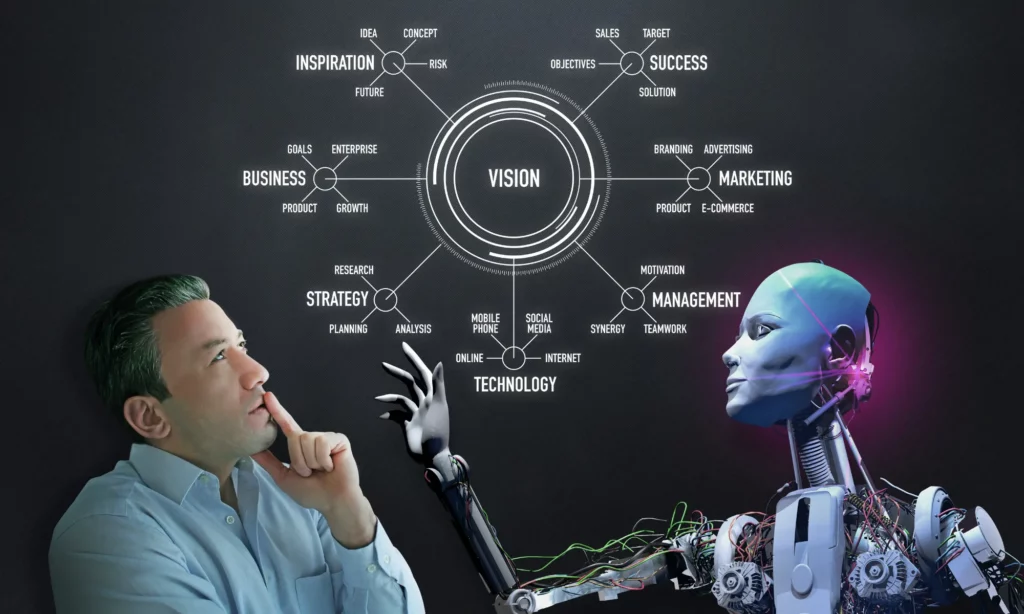
1. Customer Support
The first visible application of enterprise AI agents is in customer support. Normally, customer service teams have to process high volumes of repetitive and time-consuming queries. This might involve answering common questions about new or existing product lines, pricing options, or return policies. The introduction of enterprise AI agents releases the workload and improves customer experience as they’re capable of finding information quickly for instant responses and offer 24/7 support tirelessly. Meanwhile, they still maintain a consistent tone and response quality that aligns with your brand’s values, voice, and style.
How they help:
- Offer immediate responses to FAQs and troubleshoot common problems (e.g., struggling with logins)
- Translate voice calls and text messages in real time for multilingual support
- Suggest or automatically transfer very unique or complex requests to human specialists
- Help customers track order delivery, schedule demo calls, book appointments, etc.
- Collect feedback, resolve complaints, and analyze customer sentiment.
- Offer personalized recommendations based on customer profiles, preferences, and past interactions.
Real-world example: Telefónica is a Madrid-headquartered telecommunications company. The company used Amelia for its Peruvian contact centers to process all calls received through the hotlines. As a voice-based customer service agent, Amelia masters 28 specific skills of automating end-to-end calls and routing calls to the right human specialists. The agent could recognize customer intent accurately on over 90% of calls, reducing the customer abandonment rates by 44%.
2. Sales & CRM
Enterprise AI agents streamline and automate various manual and repetitive tasks for sales reps, especially on data entry, follow-ups, and lead tracking. This enables them to focus more on customer-facing tasks and deal closing.
How they help:
- Qualify and score leads based on criteria like firmographic data or email engagement.
- Automatically update call notes or lead information to CRMs after phone calls or meetings.
- Send personalized follow-ups via different communication channels (like emails) at the right time.
- Forecast sales opportunities by analyzing sales activity, past deals, and market shifts.
Real-world example: Smartling is one of the world’s leading companies in language translation and localization. The company leveraged Apollo (an end-to-end AI sales platform) to expand its target by automatically gathering data and insights from different sources for targeting companies more accurately. It then filtered searches, built highly specific lists, and delivered ten times more personalized emails without compromising quality.
3. Finance
Enterprise AI agents help revolutionize financial processes, especially those involving large volumes of documents, while ensuring compliance with stringent standards.
How they help:
- Automatically generate financial summaries and reports.
- Detect abnormal or fraudulent transactions and send alerts to finance teams.
- Automate invoice creation, processing, and approval.
- Cross-check payments with corresponding invoices or other financial transactions.
- Handle employee reimbursements.
Real-world example: Johnson Controls is the world’s leading company in smart buildings. Managing more than 2,000 buildings in 150 countries, the company received around 200,000 invoices manually per month. This process was too slow, and vendors felt frustrated. The company started using UiPath Document Understanding in 2023 to automate its invoice processing. This decision saved $18 million and more than 900,000 worker hours.
4. Human Resources
Every day, HR teams have to handle lots of repetitive, information-based tasks. That’s why enterprise AI agents come into play to facilitate and streamline these activities.
How they help:
- Answer employee questions about leave, policies, and payroll.
- Onboard new hires seamlessly.
- Scan resumes, schedule interviews, and send emails to shortlisted candidates.
- Analyze workforce data and create HR reports.
Real-world example: Coca-Cola Europacific Partners (CCEP) used ServiceNow HR Service Delivery and ServiceNow Safe Workplace to simplify HR processes, do away with repetitive tasks, and boost workforce productivity. The tool allowed employees to access important HR information securely and automate tasks like onboarding or organizing work/leave days. This saved 1M hours of productivity for employees.
5. IT Support
Enterprise AI agents support IT workflows, especially on helpdesk tickets, by automatically addressing common issues and enhancing ticket management.
How they help:
- Automatically handle common issues, such as password resets or VPN access.
- Transfer tickets to the right IT team member
- Track and manage system performance, as well as send instant alerts when something goes wrong.
- Offer 24/7 support via chat or email.
Real-world example: Unity is a global leading platform that specializes in creating interactive 2D and 3D experiences for various use cases, especially games. The company leveraged the Moveworks AI Copilot to interpret and resolve IT issues, like resetting passwords, troubleshooting devices, or editing email groups. Today, this AI agent can process up to 30% of these problems autonomously, achieving 90% employee satisfaction despite a doubling in IT tickets.
Top 5 Enterprise AI Agents to Watch in 2025
More and more businesses are recognizing the potential of agentic AI in increasing operational efficiency, reducing costs, and accelerating decision-making, especially in a more complex business landscape. That’s the reason why the enterprise agentic AI market in the U.S. alone is forecast to see an annual growth rate of 43.6% from 2025 to 2030. So, what are the best enterprise AI agents in today’s market? Let’s explore the top five candidates below:
1. IBM watsonx Agents
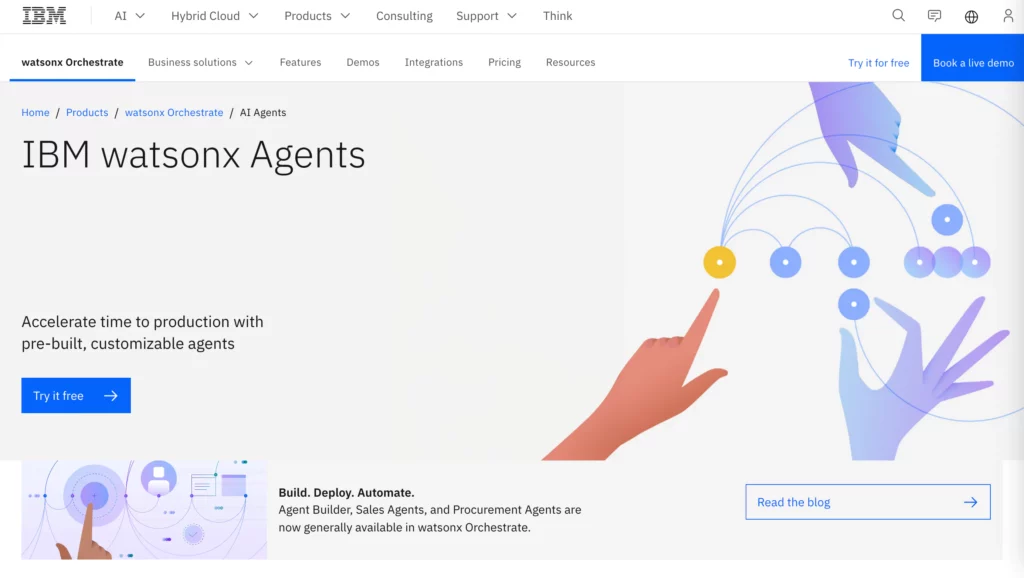
IBM watsonx Agents are pre-built, customizable agents integrated in watsonx Orchestrate. Beyond simply responding to your requests and queries, they get many things done autonomously. Developed on top of deep business logic and powered by domain-specific language models, these AI Agents can think, plan, act, and adjust to fit your unique demands.
IBM watsonx Orchestrate now allows your business to deploy custom agents across your enterprise systems, connect to your business data, and scale AI automation. These agents include:
- HR agents: Automate HR tasks, from recruiting, onboarding, and training to performance management and employee management. Further, they can automatically process requests such as recruitment outreach, job transfers, and time off. These agents can integrate with your ticketing tools or HCM (Human Capital Management) platforms.
- Sales agents: Speed up sales cycles by qualifying lists, processing objections, and creating content automatically. They can integrate with your CRM systems to search for prospects, perform follow-ups, and provide in-depth insights to unlock sales opportunities. The third one is procurement agents.
- Procurement agents: Automate sourcing, contracting, supplier evaluation, and supplier management. Connecting to external systems like SAP Ariba and Coupa, these agents can automate procurement workflows and inform decision-making based on vendor data, company policies, and contract terms.
- Customer support agents: Offer responses in alignment with your company’s values and tone, as well as escalate customers’ inquiries that they can’t handle to the right human agent.
Apart from these custom AI agents, IBM also offers a visual builder and watsonx Assistant. These tools enable you to build and deploy your own AI agents for specific business functions. Whether it’s about identifying top talent or managing sales leads, they get you covered.
2. UiPath
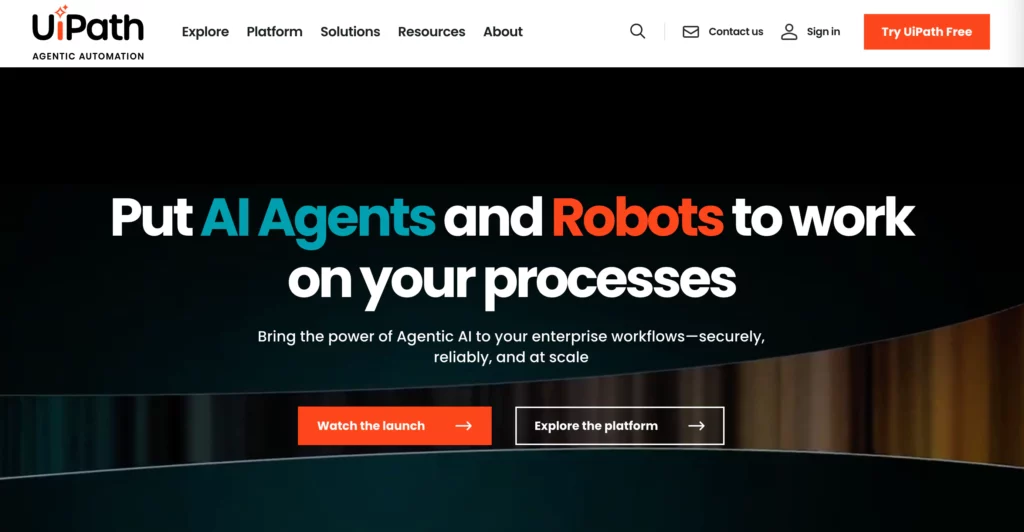
UiPath is the world’s leading enterprise automation platform. It’s traditionally known for robotic process automation (RPA) solutions that help businesses automate repetitive tasks based on rules. But today, beyond its traditional RPA technology, UiPath’s comprehensive platform also integrates other next-gen technologies, typically agentic AI, to implement complex end-to-end workflows automatically, instead of focusing only on simple tasks.
UiPath doesn’t offer customizable AI agents. Instead, it provides reusable, pre-trained AI skills (e.g., Document UnderstandingTM or Communications MiningTM) and powerful tools (e.g., Action Center, Agent Builder, Automation Hub, or Maestro). These tools help you build tailored AI agents for different business functions, from supply chain and finance & accounting to HR and contact center.
For example, for IT departments, AI agents powered by UiPath automatically perform routine work, like patching, upgrading, and testing, to reduce disruptions and free IT staff for higher-value work. They can also identify security risks and warn your IT team about them, hence accelerating your response to any cyber threats.
Or you can develop AI agents to transform all supply chain processes and logistics. These agents, accordingly, can optimize list prices, automate the RFQ process, and create a quote using real-time data to increase win rates. They can also recommend when and how many stocks to reorder. This optimizes your inventory levels and ensures the right quantities of components or materials for production.
3. ServiceNow AI Agents
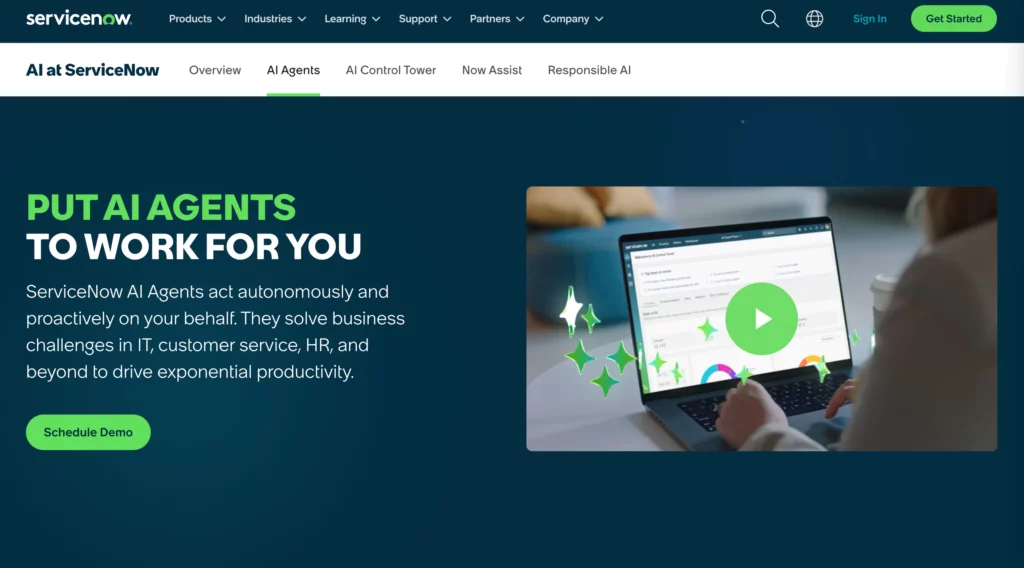
ServiceNow is an AI-powered platform that helps your business automate and manage its workflows across different departments. The tool offers pre-built, customizable AI agents that autonomously resolve business challenges in IT, HR, customer service, finance, and supply chain. ServiceNow also provides other powerful tools to develop your own agents (i.e., with AI Agent Studio) or integrate third-party agents. Through the AI Agent Orchestrator, all these agents are connected and governed to operate well and deliver personalized experiences.
They can help you handle repetitive, time-consuming tasks to complex, multi-step processes. For example, for IT departments, AI agents can automatically detect and address routine incidents with dynamic approaches powered by insights from across your instance. Further, they also route complex incidents that go beyond their abilities to the right IT experts. They also analyze the incidents’ business impact and determine root causes to help your team improve incident responses. Further, they
They can even create detailed implementation and testing plans based on requests, details, potential impacts, and past changes. They can fulfill complete software acceptance requests faster by verifying entitlements, allocating available rights, or creating purchase orders when needed.
4. Teneo
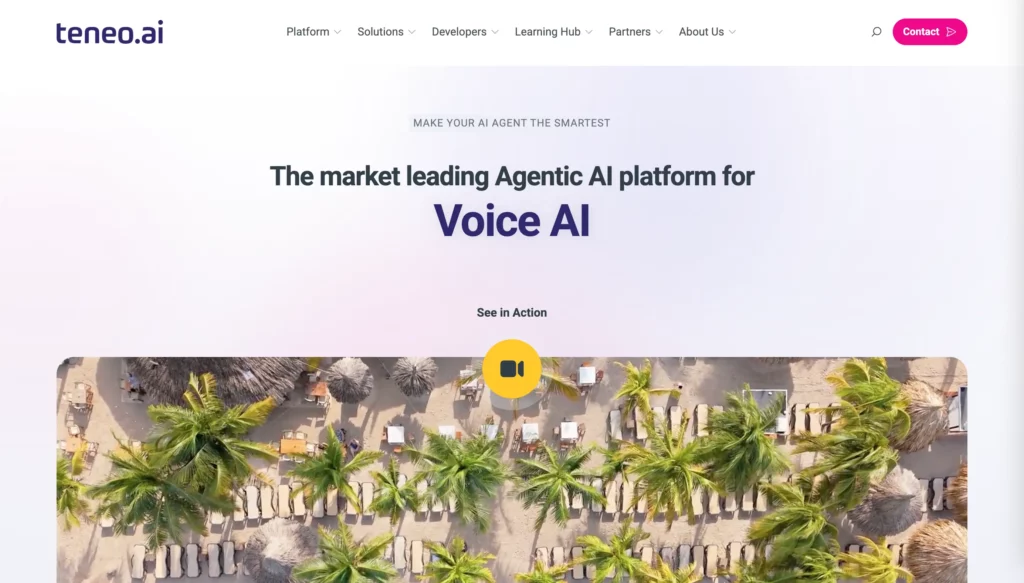
If you’re looking for an agentic AI platform for improved customer service, regardless of industry, don’t ignore Teneo.
The platform offers more than 17,000 AI agents to deal with specialized use cases and even complex, high-level tasks. These agents can be customized to your company’s internal policies, business workflows, and compliance standards. They use reasoning capabilities to adapt to different situations in real time, hence providing personalized responses and interactions.
Integrated with human-like voices, these AI agents can identify a customer’s intent with 99% accuracy and achieve more than 60% call containment. Teneo also provides Teneo Copilot, which automatically suggests the best way to build and manage your own AI agents. Further, you can test their performance in simulated environments before launch and continuously evaluate how they work through actionable analytics.
5. Moveworks
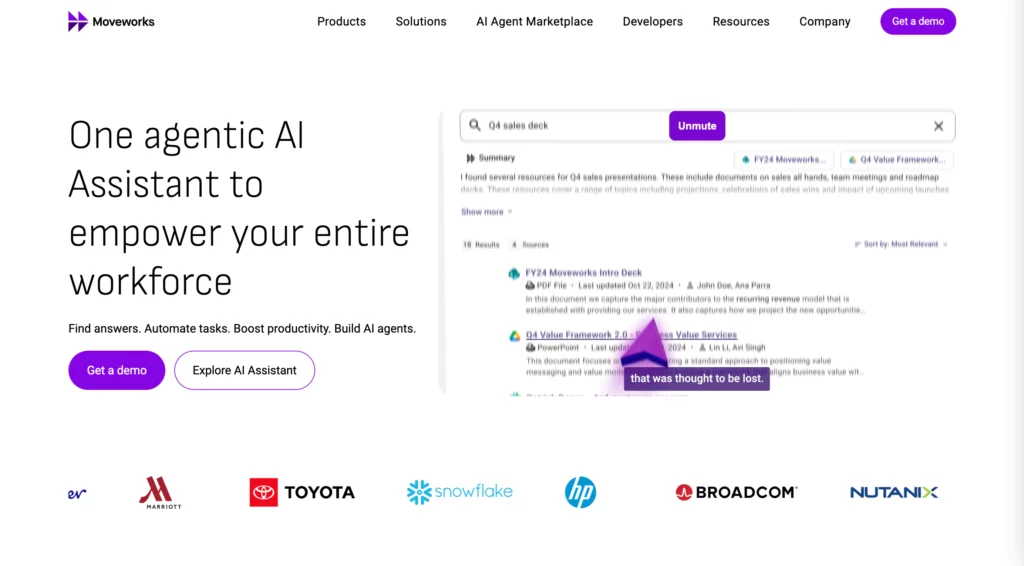
Moveworks is an easy-to-use, agentic AI assistant. It empowers your entire workforce to automate tasks in seconds, hence boosting productivity and operational efficiency. The AI agent is powered by a superior Reasoning Engine to understand your staff’s intent, develop intelligent plans, and search the right information across your enterprise applications and even from companion apps (e.g., Microsoft Teams or Slack).
MoveWorks also takes automated action on your behalf, hence supporting various departments in your business, from IT and HR to Finance and Sales & Marketing. For example, AI agents can help IT departments troubleshoot issues, proactively update tickets, manage identity and access, monitor your hardware device’s health, and more.
Meanwhile, HR teams can use AI agents to automate routine tasks, like updating legal names, tracking HR cases, or sending security training reminders. Further, these agents help onboard new hires faster, centralize key information, and create opportunities for proactive training to close skill gaps. It also deepens employee engagement by allowing them to easily book time off, discover and join ERGs, etc.
Why are Enterprise AI Agents the Next Wave of Business Automation?
Businesses worldwide will continue to look for automated and smart solutions to enhance their operations and save costs. Enterprise AI agents, therefore, appear as the next significant factor in business automation to help them fulfill this expectation.
Today, AI tools are no longer confined to processing simple tasks. Instead, they’re equipped with agentic AI capabilities to become smarter digital workers that are capable of reasoning, learning from new data or even mistakes, and working alongside the human workforce.
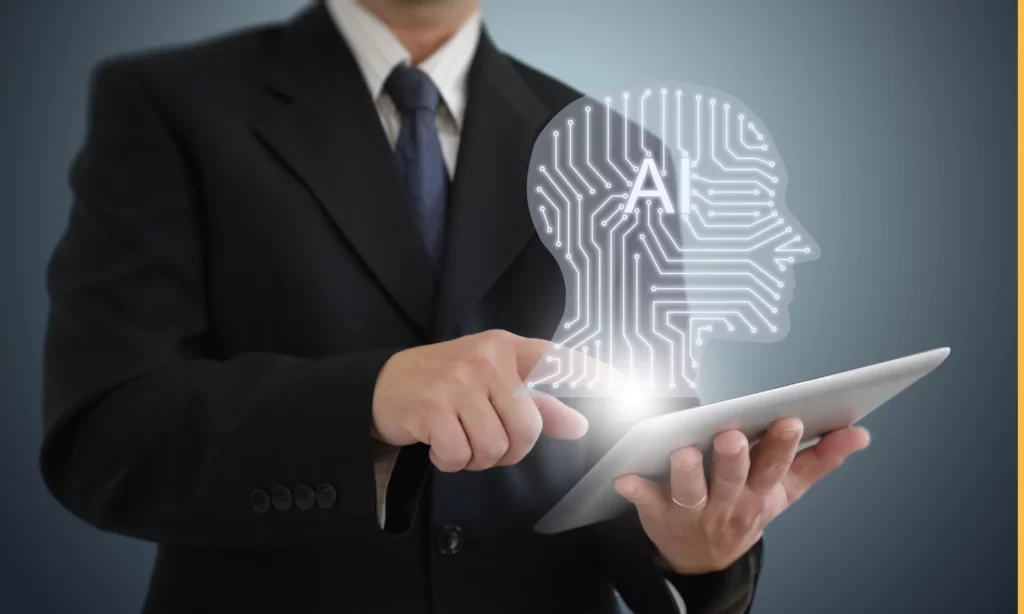
We have to admit that AI agents haven’t reached the full level of autonomy and have received much criticism for their challenges, like data quality or ethical issues. However, we predict the wave of agentic AI won’t stop. Instead, we’ll witness the emergence of two notable trends shaping the future of enterprise AI agents.
1. Rise of Multi-Agent Systems
A multi-agent system refers to a network of various intelligent agents interacting and working on the same goal. Why are multi-agent systems crucial?
We all know human requests sometimes require multiple steps to complete. For example, a new employee asks an HR agent, “I’m starting as a junior software engineer next Monday? What do I need for my first day?” A single-purpose agent can’t work independently to handle this request. There’s a need for a multi-agent system that combines various agents across departments to resolve the inquiry. HR agents will initiate onboarding workflows; IT agents offer email and system accounts, as well as requirements before work, like how to set up a laptop; meanwhile, finance agents can set up payroll and tax documentation.
So in this case, each agent, despite a different specialty, works together to achieve a shared objective. This cross-collaboration ensures tasks will be completed faster and with greater accuracy. It also lays the groundwork for enterprise automation that behaves like a well-coordinated team rather than isolated agents.
2. Augmented teams = Humans + AI
There are many arguments that AI will replace human beings in the future. This is considered one of the ethical challenges of AI agents.
Of course, with the growing adoption of AI agents, the current roles and responsibilities of human beings will change a lot. For example, human beings no longer need to manually handle data entry. Instead, AI can handle this heavy workload and even other routine tasks. This means those working heavily on data entry or repetitive tasks can be easily replaced.
However, AI agents won’t replace human employees completely, but augment them. In other words, they’ll take on repetitive work and support human beings on creative, strategic, and empathetic work. That relates to building relationships, solving complex problems, or thinking of innovative solutions. This creates a hybrid workforce that works faster, smarter, and with greater impact. So, the AI-human collaboration is not just a vision, but it’s already happening in various companies. We forecast it’ll continue to become a new norm in a business environment in the future.
Final Words
Enterprise AI agents are now becoming a crucial force in many businesses. From managing HR tasks to supporting IT departments, they possess reasoning capabilities to resolve not only repetitive, time-consuming tasks but also multi-step processes. Through this article, we hope you already have a better understanding of which values enterprise AI agents bring to different business functions, as well as the best enterprise AI agents you may consider to automate and streamline operations.
But if you want to build tailored, scalable, and high-quality AI solutions for your unique workflows, come to Designveloper for help. As one of the leaders in software and AI development, we have extensive technical expertise and hands-on experience in harnessing and integrating advanced AI technologies seamlessly into your existing infrastructure. We also have deep domain-specific knowledge across human resources, financial, and technology. Contact our sales rep now to receive a free estimation and discuss your idea further!


